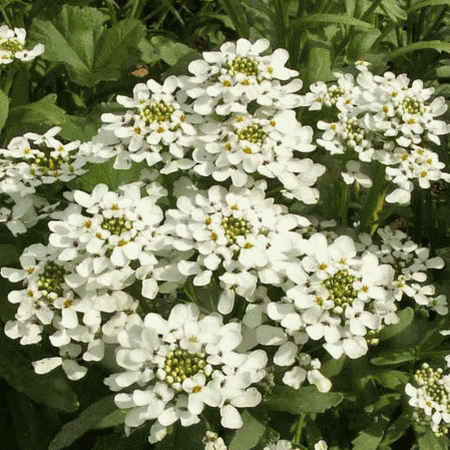Rocket, Candytuft Seeds
Key Attributes
Key Attributes
Product Details
Weight
0.01Depth
0.1Height
4.5Width
3.25Plant Height
6-12"Botanical Name
Iberis amaraSeed Type
SeedAdditional Characteristics
Attracts Pollinators, Extended BloomSeeds Per Gram
432Seeds Per Pound
196,000Packet
100 SeedsSow Depth
1/4"Seeds Per Ounce
12,250Breed
Open-pollinatedSun
Full SunUses
Cut FlowersLife Cycle
AnnualSow Method
TransplantCategories
FlowersDays To Maturity (# Days)
70Components
Growing Instructions
![]() Learning Download: How to Grow Iberis
Learning Download: How to Grow Iberis
Iberis, also known as Candytuft, are wonderful plants to grow along a border or in a rock garden. These flowers are showy because the bright white stands out brightly against the plant’s dark green foliage. They are also deer and rabbit resistant.
Before Planting: If you prefer, start the seeds indoors eight weeks before the last frost. If starting indoors, plant the seeds in individual pots and maintain a temperature of 65-70 degrees Fahrenheit.
Planting: Sow seeds directly into the garden in the spring once all danger of frost has passed.
Watering: Water about 1 inch every week that it doesn’t rain.
Fertilizer: Fertilize Candytuft once in the early spring by working some fertilizer in a ring around the plants. Use a low-nitrogen fertilizer, because too much nitrogen will cause lots of beautiful foliage but only a few blooms.
Days to Maturity: Iberis begins to bloom in the spring.
Harvesting: These flowers typically don’t make the greatest cut flowers as they are ground-hugging and used best as a border or groundcover.
Tips: While growing Candytuft plants, make sure you deadhead the spent blooms as soon as they fade to prolong the plant’s blooming season.
Shipping Schedule
Our Seed Promise
 "Agriculture and seeds" provide the basis upon which our lives depend. We must protect this foundation as a safe and genetically stable source for future generations. For the benefit of all farmers, gardeners and consumers who want an alternative, we pledge that we do not knowingly buy or sell genetically engineered seeds or plants.
"Agriculture and seeds" provide the basis upon which our lives depend. We must protect this foundation as a safe and genetically stable source for future generations. For the benefit of all farmers, gardeners and consumers who want an alternative, we pledge that we do not knowingly buy or sell genetically engineered seeds or plants.
The mechanical transfer of genetic material outside of natural reproductive methods and between genera, families or kingdoms, poses great biological risks as well as economic, political, and cultural threats. We feel that genetically engineered varieties have been insufficiently tested prior to public release. More research and testing is necessary to further assess the potential risks of genetically engineered seeds. Further, we wish to support agricultural progress that leads to healthier soils, to genetically diverse agricultural ecosystems, and ultimately to healthy people and communities.
To learn more about the "Safe Seed Pledge" please visit www.councilforresponsiblegenetics.org.

